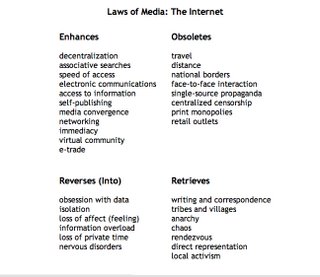Biologists suggest that memory has a role in all complex systems including ecosystems because the past can inform the present.
Marshall McLuhan recognized this as part of his tetrad theory that attempted to illuminate the effects of technology on society. He called it the Laws of Media and they are comprised of 4 questions:
1. What does “it” EXTEND or INTENSIFY?
2. When extended beyond its limit, into what does “it” REVERSE or FLIP?
3. What does “it” OBSOLESE?
4. What formerly obsolesced form does “it” RETRIEVE from the past?
I bet you McLuhan might suggest that having answers to these questions are far more important to predicting the use and success of a technology innovation than the traditional problem/solution model. After all, you can’t really predict the future by looking at the past.
The past however, and more specifically, our memory, has everything to do with the present. It informs how we view the world.
Let’s think about Coke for a second and the now classic (oh there I go with the puns again) example of blind taste testing for new Coke. While new coke succeeded in testing it failed miserably once launched. Some say it was because they didn’t take into consideration the flavour of Coke alongside the brand association. I would agree with that, but as well, I think that our memory associates our old experiences and bridges them with the new. Particularly if our old experiences were positive, we find ourselves longing for that past feeling and look to find it in other things.
So back to the Laws of Media. Here is an example that I found online using the tetrads to look at the Internet.
So when you are creating a new innovation and disrupting the world, don’t forget to think about how memory plays into it. Think about what your product retrieves from the past. It could be important.
Wednesday, 22 November 2006
The Importance of Memory
Subscribe to:
Post Comments (Atom)




0 comments:
Post a Comment